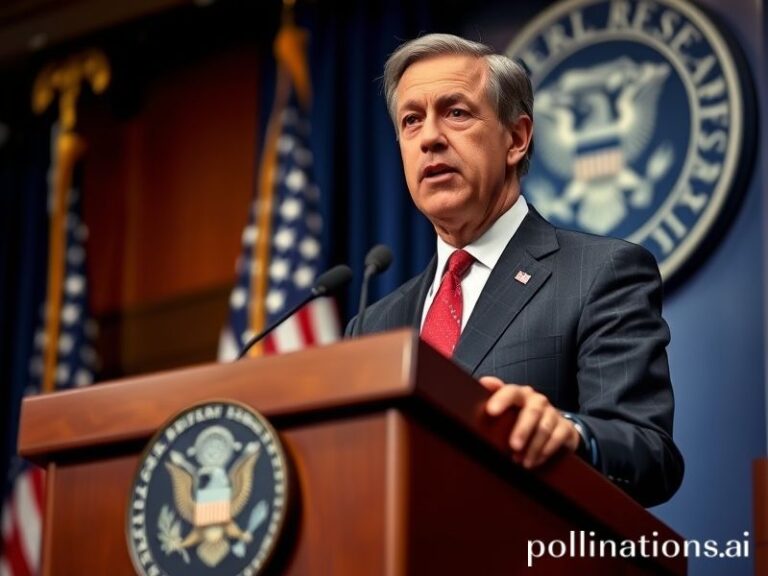How Peter Andre Accidentally Became Britain’s Last Great Export After Brexit
The Geopolitics of Chest Hair: How Peter Andre Became an Unlikely Soft-Power Asset for a Post-Brexit Britain
By the time the sun rises over the marble colonnades of the European Parliament, negotiators in Brussels are already whispering about “The Andre Doctrine.” Not, as one might hope, a radical new trade policy, but rather the quiet realization that one Cypriot-Australian-British crooner with a six-pack older than TikTok is doing more for the UK’s battered global image than a decade of white papers and Liz Truss photo-ops.
From the glass towers of Dubai to the karaoke bars of Manila, Peter Andre’s 1996 hit “Mysterious Girl” has become the sonic equivalent of a diplomatic passport. Belted out at 3 a.m. by shirtless finance bros in Singapore, hummed by UN peacekeepers in Goma, it is a reminder that soft power need not be soft at all—it can be oiled, flexing, and inexplicably wearing a bandana. In a world where nations measure influence in semiconductor fabs and hypersonic missiles, Britain has accidentally weaponised a falsetto. One suspects the Foreign Office is taking notes between budget cuts.
How did we arrive here? Trace the supply chain. Andre was born in Harrow to Greek-Cypriot parents, raised in Australia, and later re-imported to the UK like an overpriced Wagyu steak. This triple citizenship gives him the rare ability to annoy three continents simultaneously, a sort of geopolitical turducken of mild irritants. When the Brexit referendum detonated Britain’s cultural stock, Andre’s enduring popularity in the Commonwealth provided an emergency reserve of nostalgia. Ottawa housewives still clutch his 1997 calendar; Sydney radio DJs still spin “Flava” during cyclone warnings. The man is a human free-trade agreement with better abs.
Meanwhile, the developing world has adopted him as shorthand for Western excess. In Lagos clubs, DJs drop “Mysterious Girl” whenever the generator flickers—a cue that the bourgeoisie has arrived and the champagne is probably fake. Kenyan TikTokers splice his 90s music videos with footage of Nairobi traffic jams, creating a genre academics now call “Petro-Andreism”: the aesthetic collision of aspirational pop and infrastructural despair. It is only a matter of time before the IMF starts attaching structural-adjustment playlists to its loans.
Europe, naturally, remains unconvinced. French cultural attachés still wake in cold sweats imagining a Europop future where Schlager is replaced by Mediterranean R&B. Berlin techno purists dismiss Andre as “neoliberal torso music,” a phrase so perfectly German it should come with its own umlaut. Yet even they concede that after Brexit, Britain had to pivot somewhere. If you can’t sell chlorinated chicken, you might as well export a man who once marinated himself in baby oil for a music video shot in Thailand—an ecological crime the UN has inexplicably overlooked.
Of course, every empire needs its myths. In the United States, Andre is less a singer than an internet punchline, a living reminder that the 90s were not, in fact, kind to anyone. But American meme culture is famously promiscuous; having exhausted its own celebrities, it now imports second-tier British heartthrobs the way it once imported spices. Last month, the Pentagon accidentally included “Mysterious Girl” in a psy-ops playlist intended for Somali pirates. The pirates reportedly surrendered within hours, though sources say they merely wanted the speakers turned off.
There is also the existential question: what does it mean for humanity that a man whose greatest lyrical achievement is the line “She’s so hot, hot, hot, like a tamale” can still sell out the O2 Arena in 2024? Perhaps it means that in an age of climate collapse and algorithmic governance, we crave the simpler apocalypse of frosted tips. Or perhaps it confirms that culture is just another supply chain, and Peter Andre is the last remaining container of pre-digital sincerity—shipped, shelved, resold, and now retro-chic in a world that has run out of futures to sell.
As COP28 delegates argue over carbon credits in Dubai, one can imagine a rogue negotiator slipping on headphones, pressing play, and being transported to a beach where geopolitics is solved by pelvic thrusts alone. It won’t save the planet, but it might delay the despair by three minutes and forty-five seconds. And in the grand bazaar of modern life, that’s practically a binding resolution.







